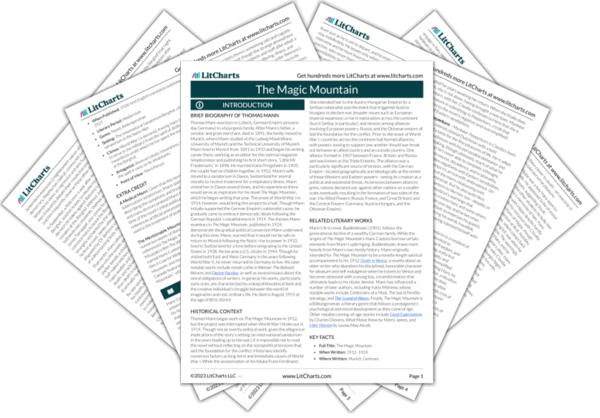Summary
Analysis
Mynheer Peeperkorn, an old, colonial Dutchman from Java and recently retired from the coffee trade, arrives at the Berghof with Madame Clavdia Chauchat the night she returns, and they dine at the sanatorium’s restaurant that evening. He takes all his meals sitting beside Clavdia at the Good Russian table. Behrens doesn’t know where Clavdia found him, but he’s heard that the two share all traveling expenses and that Peeperkorn is quite wealthy. He adds that Peeperkorn is at the Berghof as a resident—he has alcohol-induced mucus obstruction and suffers some sort of tropical fever. Peeperkorn is a tall, large man with a thin beard and “quite small and pale” eyes. Hans describes Peeperkorn as “robust and yet spare,” a curious pair of traits that often don’t go hand in hand. Behrens says Hans will have to get used to the idea of Peeperkorn—he’s here to stay.
Hans’s hope to see Clavdia again has at least partially motivated his choice to remain at the Berghof. Now that she has returned, seemingly with a new lover, one might predict that Hans will realize how naïve and misguided his dream of resuming a romance with Clavdia has been all along. The narration introduces Mynheer Peeperkorn as Hans’s opposite. While Hans is young, bourgeois, and only moderately ill, Peeperkorn is old, wealthy, and apparently quite ill. The detail of his illness being the result of excessive consumption of alcohol, meanwhile, suggests that he has a penchant for decadent vices. He embodies, in short, the irrational and sensual personality that Hans strives—and perpetually fails—to achieve.
Themes
Peeperkorn has an entertaining, loud personality that attracts an attentive audience at his dining table, even if what he says comes out as “incomprehensible phrases.” At other times, Peeperkorn seems to be on the verge of saying something grand and important, only to ultimately say nothing at all.
Peeperkorn’s captivating and bold personality conceals his inner emptiness: in fact, his thoughts are irrational, and he has nothing of substance to say. Given Hans’s track record of gravitating toward superficially interesting personalities like Naphta and Clavdia, not recognizing that their outer gravitas obscures their vapid, destructive interiors, readers may predict that Hans will become similarly captivated by Peeperkorn.
Themes
Once, Peeperkorn approaches the serving woman in the dining hall (who has dwarfism) and exuberantly lets her know that he doesn’t mind her smallness. In fact, he says, he thinks it’s great and reflects her modest character, which is also great. He adds that he would like a small favor from her. He also asks her name (Emerentia), and this makes her blush with satisfaction. Peeperkorn rambles on about various unrelated subjects before getting to the point and asking Emerentia for a glass of gin served neat. Emerentia obeys immediately, abandoning her other work to bring Peeperkorn his drink. Once she returns with his drink, he takes Clavdia’s hand in his own and looks on at his fellow tablemates “with refreshed eyes.”
Peeperkorn’s obnoxious flattering of Emerentia illustrates his tendency to ramble and lose focus—he has no sense of urgency or purpose, and by extension, no regard for time management. Further illustrating this point is Peeperkorn’s choice to order a glass of straight gin despite having an alcohol-induced illness, which suggests that he’s in no hurry to recover and leave the Berghof.
Themes
Everyone at the Berghof is quite taken with Peeperkorn, and they all notice the expensive necklace around Clavdia’s neck and look at Hans with pitying glances. And indeed, the unexpected circumstances surrounding Clavdia’s return to the Berghof hit Hans hard. During mealtimes, Clavdia doesn’t look at Hans, and she and Peeperkorn keep to themselves during social hours. Later, Hans learns that Behrens has diagnosed Peeperkorn as having “Quartan fever,” since he falls ill with it every fourth day and suffers a fever and chills, as well as a swollen spleen.
Peeperkorn’s exuberance, wealth, and obvious romantic attachment to Clavdia give him an unsurmountable advantage over Hans in the competition for Clavdia’s love. Of course, her refusal to directly interact with or even make eye contact with Hans suggests that no such competition exists: Clavdia is not interested in Hans, and yet Hans irrationally chooses to pine for her anyway.
Themes
Get the entire The Magic Mountain LitChart as a printable PDF.













